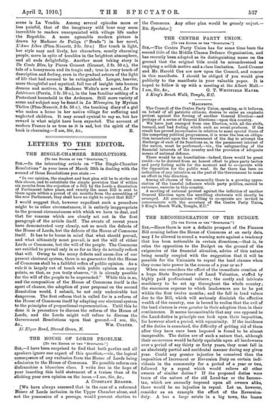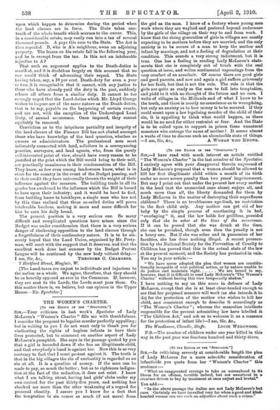THE RECONSIDERATION OF THE BUDGET. [To THE EDITOR OF THE
"SPECTATOR."1
Sin,—Since there is now a definite prospect of the Finance Bill coming before the House of Commons at an early date, may I be allowed to sound a warning note against a tendency that has been noticeable in certain directions,—that is, to relax the opposition to the Budget on the ground of the exigencies of the financial situation, advice of this nature being usually coupled with the suggestion that it will be possible for the Unionists to repeal the land clauses when they come into power in the course of a year or so ?
When one considers the effect of the immediate creation of a huge State Department of Land Valuation, staffed by highly paid professional valuers ; the costly and intricate machinery to be set up throughout the whole country; the enormous expense to which landowners are to be put within the first twelve months ; and the fall in land values due to the Bill, which will seriously diminish the effective wealth of the country, one is bound to realise that the evil of the land clauses is even greater in their adoption than in their continuance. It seems inconceivable that any one opposed to the Land-duties in principle can look upon their imposition, for however short a period, with equanimity. If the incidence of the duties is examined, the difficulty of getting rid of them after they have once been imposed is found to be almost insuperable. The duties are of such a nature that, although their occurrence would be fairly equitable upon all landowners over a period of say thirty or forty years, they must fall in an absolutely partial and accidental manner during any given year. Could any greater injustice be conceived than the imposition of Increment or Reversion Duty on certain indi- viduals in the community for a period of a year or two, followed by a repeal which would relieve all other owners of similar duties ? If the proposed duties were taxes of the nature of the old Land-tax or the Income- tax, which are annually imposed upon all owners alike, there would be no injustice in repeal. Let us, however, consider as an example the effect of the Reversion- duty. A has a large estate in a big town, the leases upon which happen to determine during the period when the land clauses are in force. The State takes one- tenth of the whole benefit which accrues-to the owner. This, in a considerable estate, may easily run into a tax of several thousand pounds. A pays this sum to the State. The Act is then repealed. B, who is A's neighbour, owns an adjoining _ property. The leases on his estate fall in the following year, and he is exempt from the tax. Is this not an intolerable injustice to A?
That such an argument applies to the Death-duties is manifest, and it is doubtless largely on this account that no one would think of advocating their repeal. The State having taken, say, a 10 per cent. Death-duty for even a year 'or two it is recognisable that it cannot, with any justice to " those who have already paid the duty in the past, suddenly release all others from a similar duty. It cannot be too strongly urged that the Land-duties which Kr. Lloyd George wishes to impose are of the same nature as the Death-duties, that is to say, payable on the happening of certain events, and are not, with the exception of the Undeveloped Land Duty, of annual occurrence. Once imposed, they cannot equitably be removed.
Conviction as to the iniquitous partiality and inequity of the land clauses of the Finance Bill has not abated amongst those who have knowledge of the land question, whether as owners or administrators. The professional men most intimately connected with land, solicitors in a conveyancing practice, surveyors, and land agents, who, from the purely self-interested point of view, should have every reason to be justified at the grist which the Bill would bring to their mill, are practically unanimous in their condemnation of the Bill. They know, as few even among landowners know, what is in store for the country in the event of the Budget passing, and to their credit they have universally thrown the weight of their influence against the measure. The building trade in all its grades has awakened to the influence which the Bill is bound to have upon their industry; and it would be hard to find, from building lessee to bricklayer, a single man who has not by this time realised that these so-called duties will prove intolerable burdens, making it more and more difficult for him to earn his daily bread.
The present position is a very serious one. So many difficult and complicated questions have arisen since the Budget was under consideration that there is a very serious danger of slackening opposition to the land clauses through a forgetfulness of their confiscatory nature. It is to be sin- cerely hoped that the Land Union, organised by Mr. Prety- man, will meet with the support that it deserves, and that the excellent work done last summer by the Budget Protest League will be continued by the new body without delay.—
[The Land-taxes are unjust to individuals and injurious to the nation as a whole. We agree, therefore, that they should be as heartily opposed as ever in the Commons. If, however, they are sent to the Lords, the Lords must pass them. On this matter there is, we believe, but one opinion in the Upper House.—En. Spectator.]











































 Previous page
Previous page